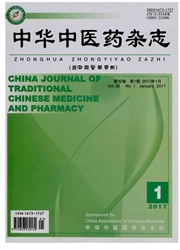

 中文摘要:
中文摘要:
目的:探讨围绝经期综合征患者肝郁病理与舌苔上皮细胞凋亡的相关性。方法:采用证素辨证方法,选择围绝经期综合征肝郁患者100例,健康对照组30例,分别采用TUNEL法及免疫组化方法检测舌苔上皮细胞凋亡及雌激素受体(ER)、孕激素受体(PR)。结果:①围绝经期综合征各组肝郁积分显著高于对照组;舌苔上皮细胞凋亡指数:肝郁各组显著高于对照组(P〈0.01),肝郁2级组及肝郁3级组均高于肝郁1级组(P〈0.05,P〈0.01);②各组舌苔上皮细胞雌、孕激素受体均有弱表达,但组间无显著性差异。结论:①肝郁是围绝经期综合征患者主要的证候,与舌苔上皮细胞凋亡存在一定的相关性;②ER、PR可能不是影响舌苔上皮细胞凋亡的关键因素。
 英文摘要:
英文摘要:
Objective: To explore the interrelationship between stagnation of liver-QI and tongue epithelial cell apoptosis in perimenopausal syndrome. Methods: 100 cases of the perimenopausal syndrome with liver depression were observed, 30 healthy women as control. The TUNEL assay for tongue epithelial cell apoptosis and the immunohistochemical detection for estrogen and progesterone receptors (ER, PR) were used. Results: ①stagnation of liver-QI score level in each perimenopausal syndrome group was significantly higher than that in control group (P0.01); Cell apoptosis index in 3 different group of stagnation of liver-QI was significantly higher than that in control group (P0.01), stagnation of liver-QI level 2, 3 significantly higher than level 1(P0.05, P0.01). ②The positive rate of estrogen and progesterone receptor (ER, PR) of tongue epithelial cells were lower, there was no significant difference among the groups. Conclusion: ①The stagnation of liver-QI is one of the important pathogenesis of perimenopausal syndrome, and which is related to the tongue epithelial cell apoptosis. ②The ER and PR are not the key factors for affecting the cell apoptosis of tongue. The changes of tongue coating may be the result of multi-link factors.
 同期刊论文项目
同期刊论文项目
 同项目期刊论文
同项目期刊论文
 期刊信息
期刊信息
